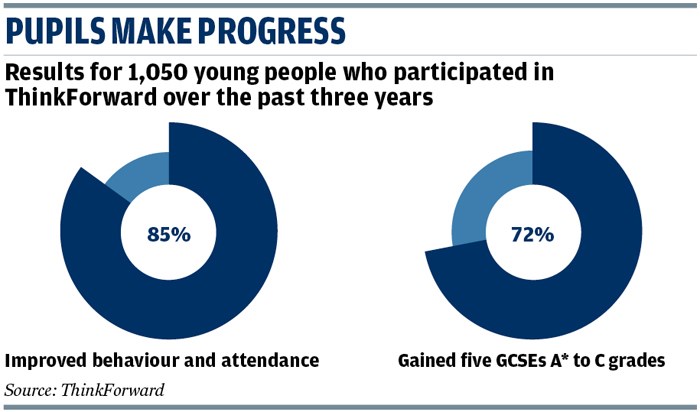How coaches help young people to stay in school
Emily Rogers
Tuesday, January 5, 2016
Personal advisers support teenagers at risk of becoming Neet to achieve the qualifications needed for college or apprenticeship places.

Project
ThinkForward
Purpose
To prevent young people dropping out
of school and becoming Neet (not in education, employment or training)
Funding
£450,000 each from social investors Impetus-PEF and Big Society Capital from April 2012 to September 2015, through the Department for Work and Pensions’ Innovation Fund
Background
Young people who do well at school and gain five good GCSEs at grade C and above are less likely to end up Neet but some may need extra support to stay on track.
In 2009, Tower Hamlets Council trialled a project involving personal advisers supporting pupils into further education or apprenticeships in an effort to ensure teenagers were sufficiently prepared to compete in the jobs market. Two years later, the Private Equity Foundation – now known as Impetus-PEF – developed this into the ThinkForward programme, piloting it in three schools in Tower Hamlets, Hackney and Islington. In 2012, a new Department for Work and Pensions funding opportunity arose, involving social investors providing initial capital and receiving payments from the department for set outcomes, such as qualifications achieved and progression into employment.
This social impact bond (SIB)enabled ThinkForward to start in 10 schools in the three London boroughs in September 2012.
Action
ThinkForward involves “progression coaches” providing five years of one-to-one support to 13- and 14-year-olds at risk of dropping out. Recruitment started in April 2012. The competitive salary offered was designed to ensure continuity of support from professionals “right at the top of their game”, explains ThinkForward managing director Kevin Munday. “We wanted them to have parity of esteem with senior teachers, so they weren’t just advising and supporting young people, but also helping challenge the whole school approach to vulnerable young people,” he says.
Ten coaches were employed by delivery partner Tomorrow’s People through the SIB funding and a further four were employed through other grants, as the number of schools increased to 14. The coaches largely came from youth work, teaching, counselling or advice and guidance backgrounds and received eight days of training.
Young people most at risk of becoming Neet are identified through data on areas such as attendance, behaviour and attainment then a panel of staff at each school use their knowledge to decide who should participate.
The programme starts in years 9 or 10 with fortnightly one-to-one support, enabling coaches to build relationships with participants and help them set goals. Meetings reduce to once a month in years 11 and 12, when coaches focus on helping young people achieve the best results possible, ensuring they have a clear progression plan and take up a college or apprenticeship place. “When young people drop out of further education, the most vulnerable point is the first term,” explains Munday. “So it’s about making sure they stick with that first term, or enabling them to quickly make a change.”
In the final year, young people meet every six weeks with their coaches, who support them through qualifications, building personal networks and getting into work or higher education.
Progression plans may involve anger management sessions, enrolment in the Duke of Edinburgh’s Award or the National Citizen Service, or support for issues such as substance misuse, working with families where necessary.
ThinkForward also provides tailored work-based activities to ensure young participants are ready for the workplace and to build self-belief and motivation. This may start with brief workplace visits to provide a taste of jobs that might interest young people followed by one or two days of job shadowing and building gradually to work experience. Workshops led by employers, covering skills such as interviewing and CV writing, are also offered.
Outcome
Of the 350 18-year-olds graduating from the programme in the last academic year from 2014 to 2015, 91 per cent progressed into further education, employment or training, including 24 per cent who gained a university place, according to figures gathered by ThinkForward.
Of the 1,050 young people who participated in the scheme over the last three years, 85 per cent improved their behaviour and school attendance, while 72 per cent who took GCSEs achieved five A* to C grades. Overall, 21 per cent of school leavers participating in the programme got into work.

If you think your project is worthy of inclusion, email supporting data to derren.hayes@markallengroup.com




